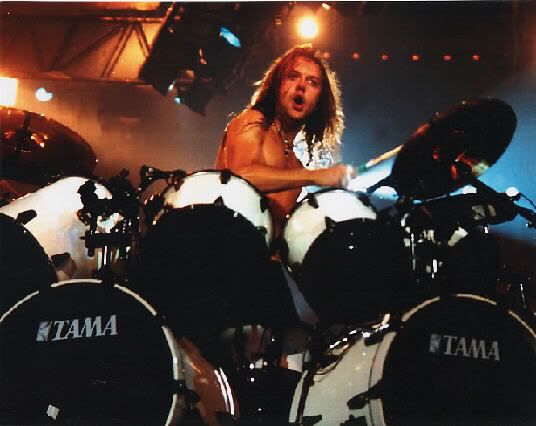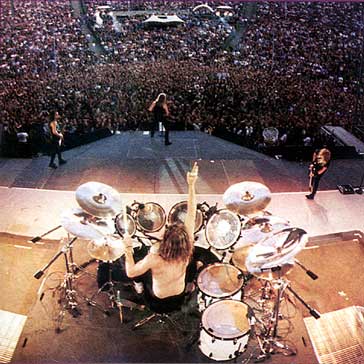Metallica have easily been arguably the best, most influential and most respected Heavy Metal band of the 80's and the 90's. Instead of drifting off in their own success, they brought the music back down to Earth, back to the street, where it belongs.
The band formed after a series of events in 1981: Lars Ulrich, a Danish born drummer living in the Bay Area of San Francisco, was looking for someone to 'jam' with. He put an add in the local Trading Post, 'The Recycler,' stating that he was interested in playing drums for a band. To answer his add was James Hetfield, a 19-year-old guitarist, also living in the Bay Area of San Francisco. The two started playing together their favorite Heavy Metal songs, such as those by such bands as Diamond Head, and Black Sabbath. Hetfield later asked roommate (and part-time bassist), Ron McGovney to join the band, and McGovney accepted the offer. The trio then recruited lead guitarist Dave Mustaine, and the band was complete, or was it....
With Hetfield doubling up on vocals, the band recorded their first demos in mid-1981. The demos entitled "No Life 'Till Leather," became the product of bootleggers, and the band became popular among the Underground Heavy Metal community.
Later, when Hetfield and Ulrich attended the concert of a fellow Bay Area band called Trauma, they were stunned by the 'volcanic' ability of Trauma's bassist: Cliff Burton. Subsequently, McGovney was kicked out of the band by Hetfield and Ulrich, and the very impressive Burton was asked to join Metallica. After some strenuous decision making, Burton decided to join. Metallica then started to play concerts, mainly as a warm-up band for established Metal acts such as Saxon, and Metallica's popularity grew, while they hadn't even released their first album yet.
Mustaine, the band's lead guitarist became increasingly unpopular with the other three members of the band. His daily intake of drugs and alcohol was not liked by Hetfield and Ulrich, so, in turn, Mustaine was kicked out of the band.
The band searched for another lead guitarist. They attended many concerts of other Bay Area bands, and, they got lucky. They found Kirk Hammet, a guitarist playing for a little known band called Exodus. The trio were in awe of Hammet's lightning-fast fingers which played intricate minute-long solos, that left the fret board on the guitar smoking after they had finished. Hammet was therefore asked to join the band, and after an age of thinking, Hammet decided to leave Exodus, and join Metallica.
For the next year, Ulrich, Hetfield, Burton and Hammet worked on improving the songs they had written in the No Life 'Till Leather demos, and wrote new songs, all while performing concerts all over the country. A recording contract was secured with American recording label Elektra, and in 1983, the band released their first album: "Kill 'Em All." Kill 'Em All contained improved songs from the No Life 'Till Leather demos, and couple of songs written by the band after Burton and Hammet had joined. The album was a huge success amongst the Heavy Metal community, but it never really broke into the mainstream music market.
After the release of Kill 'Em All, the band decided to cut down on the touring, and decided to work instead, on writing their next album. "Ride the Lightning," the band's second album, was released almost exactly a year after Kill 'Em All. It was the product of a year's hard work. As with Kill 'Em All, Ride the Lightning was a success, and it continued in the traditions of the speed-orientated music from the first album.
Metallica's popularity grew with the release of their album, "Master of Puppets," released in 1985. Some say that 'Puppets' is the best all time Heavy Metal album. It, as with the previous albums was a great success, and Metallica were more popular than ever before.
After the release of 'Puppets, the band decided to go on a world tour, mainly because on the huge success of their albums. The tour was launched in Copenhagen, Denmark, drummer Ulrich's home town.
While on tour in Sweden, tragedy struck. Metallica's tour bus crashed on a long trip between cities, and bassist Burton was tragically killed. After Burton's funeral, the band wondered if they should continue playing or not, and they decided they would play on....
Auditions were held by Metallica for a new bassist, and many budding bass players turned out to see if they were good enough to join Metallica. Jason Newstead, with his heavy, rhythmic technique on the Bass, was chosen as the new bassist for Metallica. To work Newstead into the Metallica mold, the band decided to go back to their roots, and to play some songs written by their favorite bands, the bands which had influenced them the most in their early career. The cover songs (as they are known), were recorded, and the songs were released in 1986's $5.95 EP entitled "Garage Days Revisited." Now the EP is extremely rare, and is considered a collector's item.
With Newstead on board, 1987's "....And Justice For All," was released, Metallica's fourth album. For the first time, Metallica broke into mainstream music via the album, and it entered the American and British Top 20 in the music charts. From the album, the singles "One," and "Harvester of Sorrow," were released, and the singles also had success in the charts.
After the album, the band decided to tour again, and the "Justice" tour, as it came to known, lasted for about 3 years, from 1987 to 1990.
1991's self-titled album "Metallica," brought the band their biggest success to date, selling 7 million copies in the USA alone. The album became Number One in the American Music Charts, and the singles "Unforgiven," "Enter Sandman," and "Nothing Else Matters," became huge hits, each entering the Top 10 in both the American and British singles charts.
Then, it was back on the road again for Metallica, for yet another world tour. This time the tour lasted for four years, and the band played in such obscure place in the world such as Moscow.
The Release of 1996's greatly-anticipated "Load" album was not liked by many of Metallica's hard-core fans. For Load, Hetfield, Ulrich, Hammet and Newstead had decided to step away from the speed-metal scene, and decided to step into the arena of Alternative Rock. Although the album debuted at number one in the American charts, the older Metallica fans did not take to it greatly, they claimed that Metallica had "sold out." Metallica lost some fans, but they also gained many more new fans, who were more interested in the Alternative side of Metallica.
For the next year, in between touring, Metallica wrote songs for the next album, not phased buy the comments made by their so called fans on the Load album. Reload, the seventh album, was released in 1997. The album debuted at number four in the American charts, and like the Load album, the older fans did not like it, but the legions of younger fans continued to grow.
Metallica have always been, in their 19 year career, a constant force on music. Metallica have changed the rules for all Heavy Metal bands, not only are they respected by the fans, but also by mainstream record buyers and critics.
Many bands have emerged from the Metallica way of playing music. Kirk Hammet has become one of the most copied guitarists in all forms of music, James Hetfield has developed a signature growl in his vocals, as with his rhythm guitar, while Lars Ulrich's constant bang of the drums clicks in perfectly with Jason Newstead's bouncing, yet heavy, bass tunes. Metallica have, single-handedly changed the face of metal, forever.
Article Source: http://EzineArticles.com/?expert=Daniel_Cuts











